Building a team with a friendly and comfortable atmosphere in the company undoubtedly positively impacts employee productivity and has a tangible positive business effect. However, warm relationships within the team often evolve into workplace romance. Moreover, supervisor and employee relationships often arise. In this article, Daria Fot, HRD at EvenBet Gaming, will explain why this happens, what consequences businesses may face, and how employers can influence the situation.
According to Zety, 89% of the US workers felt attracted to a coworker. According to SHRM surveys in 2023, more than 25% of employees have been involved in romantic work relationships, and 18% have dated a superior. Moreover, representatives of Generation Z were more likely than others to say that they are open to romantic relationships with colleagues — 33%.
According to survey data published in Forbes, 57% of those involved in romantic relationships at work reported that it affected their work performance, while 43% said that such relationships led to marriage.
The problem with survey research is that respondents do not always consider a sexual relationship with a colleague as a romantic work relationship. Indeed, a study by Zety shows that in 35% of cases, the relationship is fleeting.
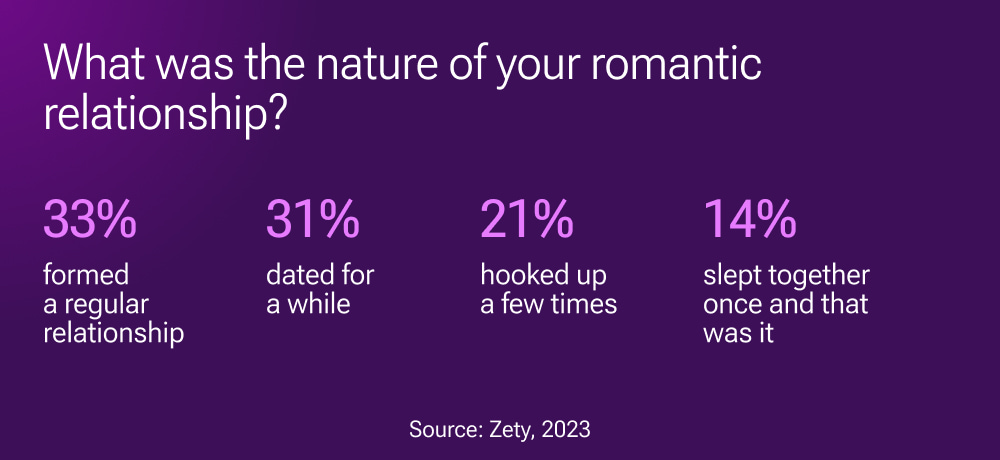
Research shows that workplace romances are quite common, and company leaders and HR departments should not only acknowledge this fact but also determine what stance to take regarding romantic relationships among employees.
Why Does This Happen?
Businesses strive to hire employees who share corporate values. As a result, people with similar values gather in one team. Moreover, common interests and preferences emerge under the influence of work tasks. People spend a lot of time at work, giving them plenty of common topics to discuss.
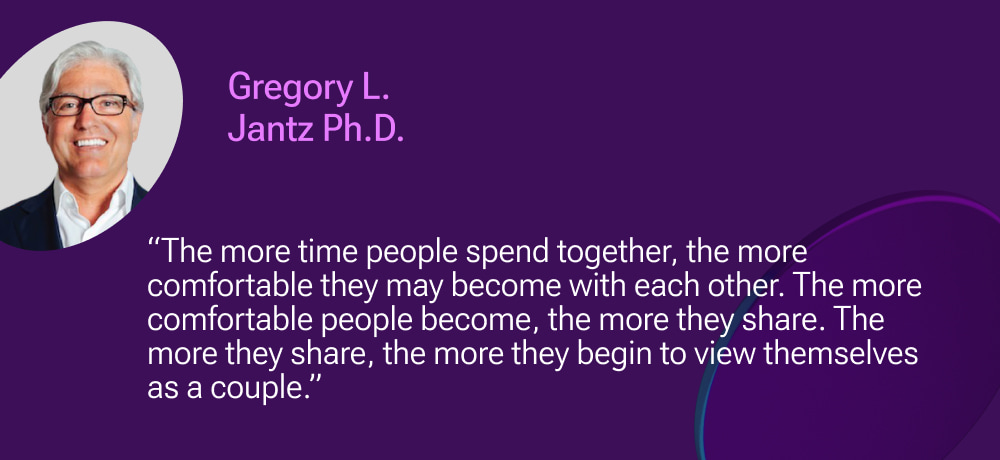
Initially, each employee has a certain psychological barrier that allows them to maintain a certain distance from colleagues, sufficient for comfortable and productive work relationships. However, over time, these barriers break down. As Gregory L. Jantz, Ph.D. , writes, these barriers break down particularly quickly in stressful work situations.
It’s most convenient to discuss work-related experiences with a colleague. After all, they are likely to show more empathy and understanding than anyone from outside, as they are in the same environment and probably experiencing similar feelings. Therefore, it’s not surprising that emotional attachment is often established between employees.
There is also the phenomenon of the “work spouse,” also known as a “workplace spouse,” “wusband,” “work wife,” or “work husband.” This term usually refers to platonic but enduring relationships between colleagues. These relationships are based on mutual support and emotional connection but often evolve into a full-fledged workplace romance. According to SHRM, 20% of participants in such relationships experience romantic feelings for their “work spouse.”
Advantages of Workplace Romance
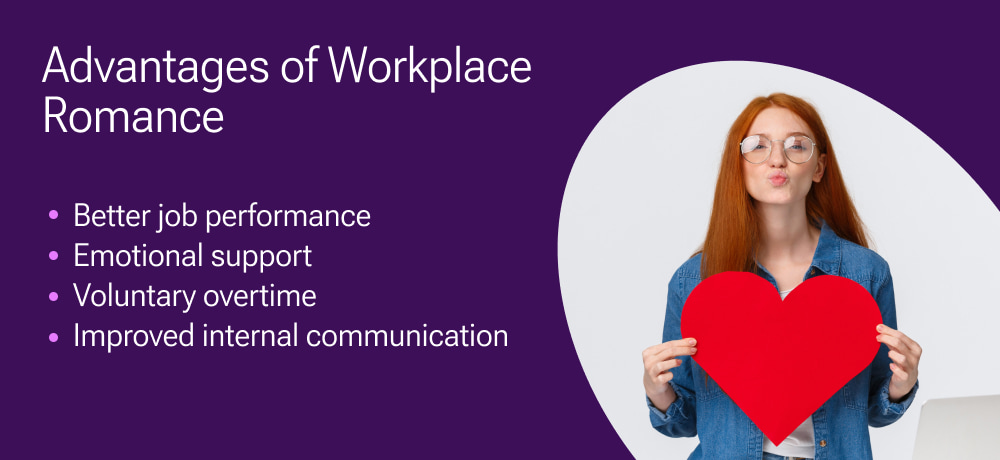
Better job performance: Employees who are in romantic relationships often tend to be more loyal to the company. This can be explained by the fact that work means more to them than just a job. Just as there is an emotional connection between them, there is also an attachment to their workplace, which brought them together and made them a happy couple. This is particularly noticeable in companies that promote family values.
Emotional support: An employee who works with their significant other experiences less negative impact from stress, as there is always someone within the team who will provide support.
Voluntary overtime: A study by KyungHee University shows that such couples demonstrate higher levels of engagement and job performance. This is particularly explained by the fact that colleagues who are a couple are more inclined to help each other with work, even if it goes beyond their job duties.
Improved internal communication: If participants in romantic relationships work in different departments, this can help establish closer cooperation between these departments, as personal relationships help bypass various bureaucratic obstacles.
Disadvantages of Workplace Romance

Consequences of breakups: According to Zety statistics, 51% of workplace love end in breakup. This often leads to the dismissal of one of the participants. Moreover, in situations involving a superior-subordinate relationship, the subordinate’s dismissal is 4.2 percentage points more likely, according to NBER research. In more painful breakups, there is a high risk for the company to lose both participants of the romance.
Bias and corruption: Relationships between a manager and a subordinate are particularly risky. In such relationships, the subordinate may receive unwarranted workload reductions or rewards. Even if there is no actual bias, it may appear so to other employees. NBER research indicates that this leads to a 4 percentage point decrease in the engagement of other workers. There are also particularly dangerous situations, such as relationships between the chief accountant and CEO, which have the potential to lead to criminal activities against the company.
Spread of disloyalty: Although couples are generally more loyal to the company, the loss of loyalty by one often transfers to the other.
Organisational challenges: Participants in workplace romances are inclined to take vacation and sick leave simultaneously, which can create management difficulties in work processes.
Double departures: When one half of a long-term couple leaves the company, the other is likely to follow suit. Especially if the departure of the first is due to relocation.
Drama: Conflict situations between employees are commonplace, and all companies have long learned to resolve them. But it’s another matter when a sudden quarrel erupts between two romantic partners at work. This creates discomfort for the entire team, sparks gossip, and disrupts the work atmosphere.
Workplace Harassment
This doesn’t quite relate to the topic of this article, but we believe it’s important to mention the issue of harassment. Regardless of your stance on romantic relationships between coworkers, you should take all possible measures to prevent harassment in the workplace.
It’s important to clearly define what constitutes harassment and what does not. Certain rules should also be established. For example, Facebook and Google have a rule: an employee can invite a colleague on a date only once. If they receive a refusal, they cannot initiate this topic again. Ambiguous answers, such as “I’m busy tonight,” are treated as if they were a clear “no.”
The HR department should always be open and accessible for communication with every employee. It’s crucial to convey to the team that the company will stand up for the victims of harassment and be able to protect them.
Even if romantic relationships are not regulated in the company, the HR department should notice love affairs between employees. Private conversations should be held with each participant in such relationships to ensure that the relationships are voluntary on both sides.
Should We Regulate Dating at Workplace?
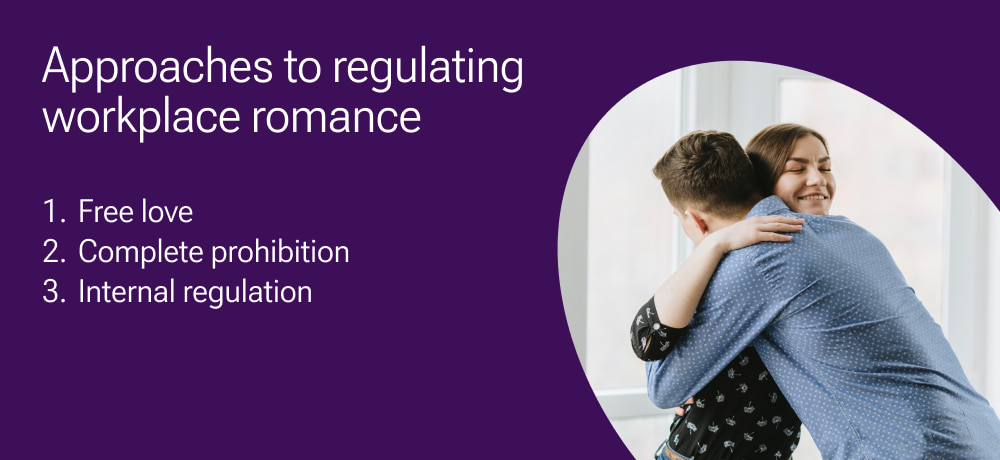
Regulating workplace love is a delicate and complex process. It should aim to mitigate the downsides of romantic relationships at work while not conflicting with corporate values and labour laws. The solution should be developed individually, based on the specifics of each company. However, three main approaches can be identified, each with its own pros and cons.
1. Free love
Many companies do not restrict romantic relationships between employees, considering it a part of their private lives that should be respected and left untouched.
Pros:
- Employees feel free, which positively impacts their loyalty.
- It potentially fosters a more positive atmosphere in the workplace, where everyone respects each other’s private lives and personal decisions.
Cons:
- HR may find it difficult to identify risks, including harassment and corruption.
2. Complete prohibition of romantic relationships at work
A company may actively prevent or completely prohibit any romantic relationships between employees.
Pros:
- This significantly reduces the likelihood of many potential negative consequences of workplace romances.
- Many employees will appreciate the company’s decisive protection against unwanted advances from colleagues.
Cons:
- If two of your employees fall in love, you may have to dismiss at least one of them, thus losing valuable talent.
- The majority of employees will be dissatisfied with total control and intrusion into their privacy.
- Since the circumstances that lead employees to engage in romantic relationships at work won’t disappear, such relationships will still occur, albeit in secret office romance. In this case, the couple will likely be psychologically opposed to the company that interferes with their happiness.
- Most likely, labour laws in your country will not support such measures, and such a decision may be deemed discriminatory.
3. Internal regulation of workplace romances
A company can introduce a set of rules aimed at maintaining the positive aspects of workplace relationships while mitigating the negative ones. Such rules may require employees to report relationships to HR. Additionally, the company can transfer a subordinate to another department if they are involved in a romance with their manager.
Pros:
- There is no direct prohibition or discrimination, but the company still addresses the risks.
- If the rules are advisory, employees are likely to appreciate the trust.
Cons:
- It may still be interpreted as an intrusion into private lives.
- There may be many personal reasons to keep a romance secret. For instance, if the company lacks a culture of inclusivity and tolerance, LGBTQ+ individuals may be afraid to report their relationships.
Author’s Personal Opinion
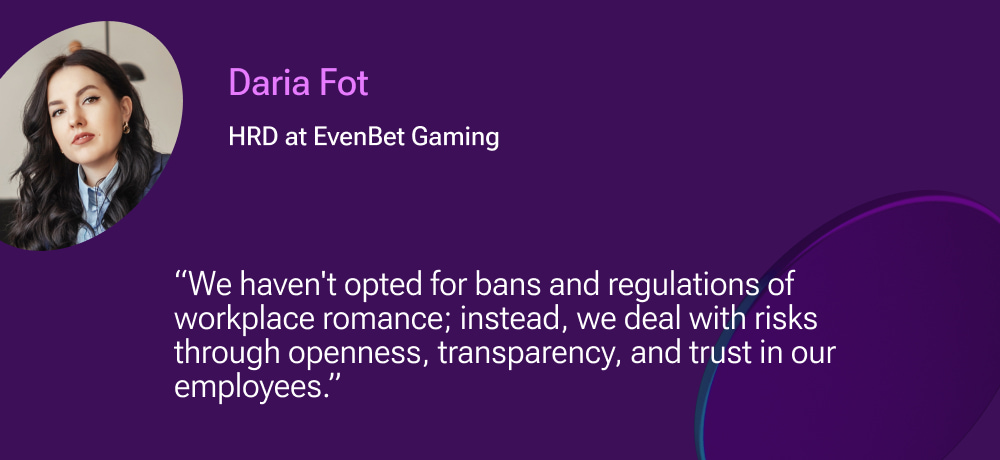
When I find out that one of my employees has entered into a romantic relationship with a colleague, it doesn’t make me happy because it complicates the work of the HR department. Moreover, over the 15 years of my career, I’ve often witnessed one employee leaving, followed by their significant other.
However, it’s important to note that the positive effects always occur, whereas the negative ones don’t. Besides, there are more important things to consider. Our company promotes family values and cherishes an atmosphere of freedom and friendship within the team. Attempting to restrict employees’ personal lives could destroy all of this.
Instead, we have organised our HR department in such a way that every employee can turn to us for help or support at any time, and the conversation will remain confidential. We haven’t opted for bans and regulations of workplace romance; instead, we deal with risks through openness, transparency, and trust in our employees.
EvenBet Gaming is a provider offering software products for the iGaming industry. Our turnkey business solutions are tailored for various types of businesses and are highly customisable to meet any needs. For more details, please contact our managers.





 Upd: 23 August 2024
Upd: 23 August 2024 





















